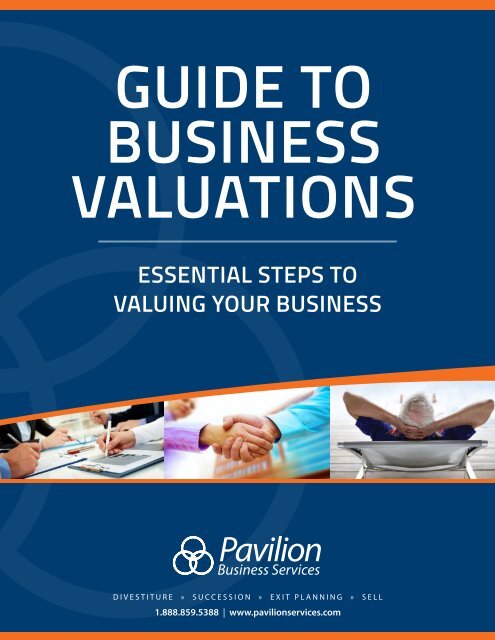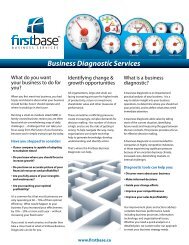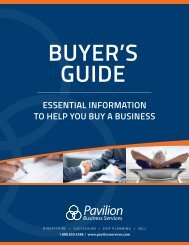Guide To Business Valuations
Create successful ePaper yourself
Turn your PDF publications into a flip-book with our unique Google optimized e-Paper software.
GUIDE TO<br />
BUSINESS<br />
VALUATIONS<br />
ESSENTIAL STEPS TO<br />
VALUING YOUR BUSINESS<br />
DIVESTITURE » SUCCESSION » EXIT PLANNING » SELL<br />
1.888.859.5388 | www.pavilionservices.com
Why do you need a Pavilion <strong>Business</strong> Valuation?<br />
A current business valuation should be a high priority for your business. It is necessary to establish the share price for<br />
business transactions such as sales, buy/sell agreement, mergers or acquisitions, dissolutions including liquidation or<br />
bankruptcy, estate planning or raising capital.<br />
We specialize in <strong>Business</strong> <strong>Valuations</strong> that are based on the “current true market value” and based on over 21 different<br />
valuation methodologies. Pavilion offers the most comprehensive and accurate means to complete the task to assess<br />
your business “fair market value”.<br />
Pavilion offers a comprehensive approach to the <strong>Business</strong> Valuation process. We employ numerous valuation<br />
methodologies as outlined in this <strong>Guide</strong>. In addition, we utilize real time access to the following resources:<br />
• Precedent database of completed transactions across North America.<br />
• Real time access to the financial performance in each SIC or Industry sector to enable an independent “yard stick”<br />
for key performance indicators (KPI’s).<br />
• RMA Ratio’s – The Risk Management Association provides a wide range of metrics that we use to assess your<br />
business and provide a “score card” .<br />
The true indicator of a company’s success is measurable by a wide range of factors. One of the main components is the<br />
financial metrics of the business including the Profit and Loss statements and Balance Sheet performance. Our team<br />
works closely with you to review and assess your business “value drivers” that ultimately determine the Enterprise Value.<br />
If you are selling, raising equity capital, liquidating or settling with creditors or vendors, you will want a high valuation.<br />
The opposite is true for those who are buying a company or doing estate planning or gifting. The valuation is useful not<br />
only for transferring a business but as a tool to measure overall company performance. The final value depends on the<br />
methods used and the purpose for which the analysis is performed.<br />
In addition, because the Pavilion team provides Merger / Acquisition and Broker services, we will be able to provide you<br />
with a truly independent assessment based on current real market conditions. Often we experience clients<br />
who present us with a valuation completed by other firms that are in most cases undervaluing the business because<br />
they don’t have the skill-set or access to relevant information. Choose wisely, as whatever decision you make can make a<br />
significant difference to the financial outcome.<br />
Yours sincerely,<br />
Greg Spafford<br />
Managing Director
Table of Contents<br />
What is your Clients’ <strong>Business</strong> Worth? 3<br />
What are the Benefits of a <strong>Business</strong> Valuation?<br />
4<br />
<strong>Business</strong> Valuation Methods<br />
5<br />
Fair Market Value<br />
6<br />
Determining Value<br />
6<br />
<strong>Business</strong> Valuation Methods<br />
7<br />
The Art and Science of <strong>Valuations</strong><br />
7<br />
Can Two Simple Questions Determine the Valuation of your Company<br />
8<br />
What are Six Things you can do to Make Your <strong>Business</strong> Harder to Replicate?<br />
9<br />
Know the Truth or Face the Consequences<br />
10<br />
What Data is Required for a Professional <strong>Business</strong> Valuation?<br />
11<br />
10 Benefits of a Professional <strong>Business</strong> Valuation<br />
12<br />
10 Value Drivers to Sell Your <strong>Business</strong> for the Highest Price<br />
13<br />
Pavilion Factsheet<br />
14<br />
Contact Pavilion <strong>Business</strong> Services<br />
<strong>To</strong> learn more about the various exit options you have as a business<br />
owner and how we can help you successfully sell your company –<br />
call us to arrange an exploratory meeting and discuss your options<br />
in a confidential manner.<br />
1.888.859.5388<br />
www.pavilionservices.com<br />
2
WHAT IS YOUR BUSINESS WORTH?<br />
The <strong>Business</strong> Valuation<br />
Buyers have deep pockets and are motivated. Now Value<br />
the <strong>Business</strong>.<br />
There will always be the buyers price, your price and the fair<br />
price. Knowing the fair value provides gut-level comfort and a<br />
huge advantage in this chaotic world.<br />
Some say a company is worth exactly what another person<br />
is willing to pay...or is it? How about the value of the assets?<br />
Or earnings and income? Is it the potential of the business?<br />
Or goodwill? Is it all or some of it? How do you arrive at that<br />
magic number fairly? More importantly, who can provide that<br />
assessment? An accountant? A lawyer? Your neighbour who<br />
sold his business? How can you be certain?<br />
Pavilion <strong>Business</strong> Services specialize in professional <strong>Business</strong><br />
<strong>Valuations</strong> that are based on the “current true market value”<br />
and based on over 21 different valuation methodologies.<br />
Pavilion offers the most comprehensive and accurate means<br />
to complete the task to assess the business “fair market<br />
value”.<br />
In addition, we utilize real time access to the following<br />
resources:<br />
4 Precedent database of completed transactions across<br />
North America that provide evidence to support the<br />
valuation.<br />
4 Real time access to the financial performance in each SIC<br />
or Industry sector to enable an independent “yard stick”<br />
for key performance indicators (KPI’s).<br />
Key Benefits of a Professional<br />
<strong>Business</strong> Valuation<br />
4<br />
RMA Ratio’s – The Risk Management Association<br />
provides a wide range of metrics that we use to assess<br />
the business and provide a “score card”.<br />
It is important to get a professional business valuation by a<br />
merger and acquisitions firm who are actively involved in the<br />
marketplace. Based on our experience, valuations conducted by<br />
others grossly over-estimate or under-estimate the value of the<br />
business.<br />
Pavilion is a professional M&A (merger and<br />
acquisitions) firm with the track record<br />
and expertise to not only put the “deal<br />
together”. Moreover, they will have the<br />
industry connections and marketing “know<br />
– how” to enable a satisfactory outcome<br />
with highest sale value and improved terms<br />
for the seller.<br />
The true indicator of a company’s success is measurable by<br />
a wide range of factors. One of the main components is the<br />
financial metrics of the business including the Profit and Loss<br />
statements and Balance Sheet performance.<br />
4<br />
<strong>To</strong>day, up to 80% of a firm’s value can be associated with<br />
intangible assets, such as brand, reputation, culture,<br />
customer satisfaction, human capital, risk management,<br />
R&D pipelines and a company’s trading license to operate.<br />
Our team works closely with you to assess the business<br />
“value drivers” that ultimately determine the Enterprise Value<br />
in the marketplace.<br />
It takes a team to put a successful deal together: an<br />
accounting firm, M&A advisors and a lawyer are all<br />
essential elements to achieve a profitable deal.<br />
3
WHAT ARE THE BENEFITS OF<br />
A BUSINESS VALUATION?<br />
<strong>Business</strong> Valuation Methods<br />
There are multiple methods when valuing a business that<br />
include valuing various components of your business,<br />
including good will, tangible and non-tangible assets, and<br />
management knowledge and commitment. A <strong>Business</strong><br />
Valuation is a valuable tool.<br />
If your valuation doesn’t consider all factors or if it uses<br />
inappropriate valuation methods, your business will be<br />
significantly undervalued.<br />
A business valuation should suit the needs of the directors<br />
and shareholder requirements. This is especially important<br />
in determining the true enterprise value. Many well meaning<br />
accounting firms provide advice that simply is incorrect and<br />
usually leads to an under-estimation of the business value.<br />
The standard practice by accountant is to rely on EBITA<br />
multipliers and these assumptions are simply incorrect. In<br />
the following pages, more details are provided to enlighten<br />
business owners on the options and considerations involved<br />
in the process.<br />
In many instances, business owners select the wrong firm<br />
to conduct their business valuation. Often accounting<br />
firms attempt this task and the result is an incorrect lower<br />
valuation than the business is actually worth on the open<br />
market.<br />
Accountants perform valuable services for their clients<br />
including bookkeeping, tax advice and year end submissions<br />
to the CRA. This does not qualify them for the task of<br />
determining “fair market value” for your business.<br />
4
BUSINESS VALUATION<br />
METHODS<br />
We offer market valuations to clients who are interested in<br />
determining the fair market value of their business. While<br />
there are a number of methodologies and techniques, they<br />
can typically be categorized into three core approaches:<br />
1. Asset based,<br />
2. Income based,<br />
3. Market Comparison based.<br />
When we conduct business valuations, a blended model<br />
is used based upon the appraiser’s judgment, assets in<br />
question, past and future cash flow capacities, as well as the<br />
depth and breadth of available financial, operational, and<br />
industry relevant data. All applicable methods used are then<br />
presented within the valuation package.<br />
ASSET BASED APPROACHES – The asset, or<br />
cost, approach considers the value of a business<br />
to be equivalent to the sum of its parts; or the<br />
replacement costs for this business. This is an<br />
objective view of a business. It can be effective<br />
in quantifying the fair market value of an entity’s<br />
tangible assets, as it adjusts for the replacement<br />
costs of existing, potentially deteriorating, assets.<br />
INCOME BASED APPROACHES – The income<br />
approach identifies the fair market value of a<br />
business by measuring the current value of<br />
projected future cash flows generated by the<br />
business in question. It is derived by multiplying<br />
cash flow of the company times an appropriate<br />
discount rate. In contrast, the asset based<br />
approaches are very objective. The income based<br />
approaches require the valuator to make subjective<br />
decisions about discount rates or capitalization.<br />
Many considerations and variables are measured<br />
to account for the specific contribution of primary<br />
value drivers in a business that result in influencing<br />
cash flow: revenue drivers, expense drivers,<br />
capital investment, etc. This method, which comes<br />
in several approaches, is useful as it identifies<br />
fundamental factors driving the value of a business.<br />
MARKET COMPARISON BASED APPROACHES –<br />
The Market Comparison approach to a business<br />
valuation is based upon current conditions<br />
amongst active business buyers, recent buy-sell<br />
transactions, and other fairly comparable business<br />
entities. Financial attributes of these comparable<br />
companies and the prices at which they have<br />
transferred can server as strong indicators of fair<br />
market value of the subject company.<br />
5
When a client engages our expertise to conduct a fair market<br />
business valuation, we view that business through numerous<br />
various approaches (all of which fall under the three<br />
primary methods) and then determine which of those are<br />
most applicable to that business and its type of operation,<br />
industry, history and future prospects.<br />
Many business owners think that a buyer should pay them<br />
the money they invested in the business, no matter what the<br />
business is generating in income and profits. Unfortunately,<br />
that’s also not the case.<br />
If you’re selling, knowing the value of your business will give<br />
you the confidence to ask for a fair price.<br />
Having an independent, up-to-date business valuation also<br />
allows you to identify areas of growth and make informed<br />
decisions about the future of your business.<br />
A calculation of value is NOT an appraisal because the<br />
appraiser is not coming to a “conclusion of value”, but<br />
merely a “calculation of value” based on a limited amount of<br />
investigation and due diligence.<br />
“Protect yourself from<br />
costly mistakes and<br />
blunders”<br />
<strong>Business</strong> <strong>Valuations</strong> are used for<br />
4 Strategic business planning<br />
4 Securing credit<br />
4 Negotiating a business purchase<br />
4 Partnership dissolution<br />
Fair Market Value<br />
Probable price at which a willing buyer will buy from a<br />
willing seller when:<br />
(1) both are unrelated,<br />
(2) know the relevant facts,<br />
(3) neither is under any compulsion to buy or sell,<br />
(4) all rights and benefit inherent in (or attributable to) the<br />
item must have been included in the transfer.<br />
FMV is generally the basis for tax assessment and court<br />
awards. Also called Fair Market Value.<br />
Asking Price Vs. Selling Price<br />
If the asking price is too high buyers may hesitate to even<br />
make an offer for the business. A high asking price may<br />
place the business outside the maximum price level of<br />
buyers looking for similar businesses, and those looking in<br />
that higher price range may see that the business does not<br />
warrant such a high price.<br />
The important factor to understand is that there isn’t one<br />
magic number that your company is worth. There is a variety<br />
of valuation methods used to determine the monetary<br />
assessment of a company. Each of these methods will<br />
provide a different figure and ultimately, the value of the<br />
company is what someone is willing to pay for it.<br />
Real World Criteria<br />
The value of a business is usually a function of its earnings,<br />
not its tangible assets. Depending upon the nature of the<br />
tangible assets, it is true that a buyer might be willing to pay<br />
more for a business with a lot of assets based on the idea<br />
that if all goes badly, the buyer can at least sell off the assets<br />
and recover some of the investment.<br />
4 Planning an exit strategy<br />
4 Settling legal disputes<br />
4 Marital dissolution<br />
4 Estate planning<br />
4 Management buy-out<br />
4 Raising working capital<br />
If you’re selling, knowing the true fair<br />
market value of your business will<br />
give you the confidence to establish<br />
and defend your asking price.<br />
6
Determining Value<br />
Determining the value of a business is both an art and<br />
a science, it’s a complex and painstaking process. Many<br />
factors have to be considered in valuing a business, such as<br />
future earnings potential, asset analysis, and environmental<br />
influences related to economic and industry conditions.<br />
<strong>To</strong> reflect the years of hard work in accumulating a business’s<br />
tangible and intangible assets, a business owner must use<br />
much more than tax returns and financial statements as the<br />
basis for the financial presentation of their business.<br />
<strong>Business</strong> Valuation Methods<br />
We are often asked by business owners to provide them with<br />
an idea of what their companies are worth. In our industry,<br />
this is called “ballparking,” and we refuse to do it because<br />
no one can tell you what your business is worth without<br />
conducting a thorough and complete evaluation.<br />
A related question that we also often hear is: What formula<br />
will you use when valuing my company? Again, at the<br />
outset, we can’t tell you that because we can’t make any<br />
assumptions about which methods will be best to use until<br />
we have done a business valuation on your company.<br />
Anyone who tells you in your first meeting with them that<br />
they either know your value or can tell you which formula<br />
they will use in valuing your business should be avoided. It is<br />
impossible to define that until the evaluation is complete.<br />
The Bare Facts...<br />
No formula can be devised that will be generally applicable<br />
to the multitude of different valuation issues.<br />
A sound valuation will be based upon all the relevant facts,<br />
but the elements of common sense, informed judgment<br />
and reasonableness must enter into the process of weighing<br />
those facts and determining their aggregate significance.<br />
In layman’s terms, this means that the valuation of a privately<br />
held company is ultimately very complicated because<br />
you have to take into account a wide variety of valuation<br />
methods in order to accurately determine value.<br />
The factors that must be examined when valuing a<br />
privately held company are:<br />
A<br />
B<br />
C<br />
D<br />
E<br />
The nature of the business and the history of the<br />
enterprise from its inception<br />
The economic outlook in general and the condition<br />
and outlook of the specific industry in particular<br />
The book value of the stock and the financial<br />
condition of the business<br />
The earning capacity of the company<br />
The dividend-paying capacity<br />
F<br />
G<br />
H<br />
Whether or not the enterprise has goodwill or other<br />
intangible value<br />
Sales of the stock and the size of the block of stock<br />
to be valued<br />
Key assets of the company including: inventory,<br />
equipment, real estate, patents, contracts, etc.<br />
7
The Art and Science of <strong>Valuations</strong><br />
As you can see, no one can tell you either what formula they<br />
will use to evaluate your company or what your business is<br />
worth in their initial meeting with you. If they do, chances are<br />
good that they are using the same valuation method on your<br />
business that they use on every company that they work<br />
with. Often these are industry-developed rules of thumb and<br />
not relevant or an accurate reflection of enterprise value.<br />
Sometimes rules-of-thumb can be accurate predictors of<br />
value. However, the danger in using this method alone is that<br />
it does not take into account anything that may be unique<br />
about your company.<br />
Using rules-of-thumb assumes that your business is exactly<br />
like every other company in your niche. In all likelihood, you<br />
have built a business that has specific distinctive features<br />
that could be key to your valuation.<br />
Nor is the rule-of-thumb value based on recast financial<br />
statements. Recasting is an accepted accounting practice<br />
that allows you to restate your historical financials to reflect<br />
your true profitability.<br />
Suffice to say, if you use a rule-of-thumb to define your<br />
value without recasting your financials, you will probably be<br />
undervaluing your company. This is just one of the common<br />
mistakes that many business owners make when selling their<br />
company.<br />
CAN TWO SIMPLE<br />
QUESTIONS DETERMINE<br />
THE VALUE OF YOUR<br />
COMPANY?<br />
As a business owner you should be really concerned about<br />
the value of your company; because your company is<br />
probably the most valuable asset you own.<br />
If your company is your biggest asset, you should want<br />
to grow it so it becomes even more valuable, with the<br />
eventual goal of building the asset to such a value that larger<br />
companies want to purchase it for a large sum, or you can<br />
take it public.<br />
While there are all types of questions and complex analyses<br />
that can be done to try to pinpoint the value of your<br />
business, your value can really be condensed into just two<br />
questions:<br />
1. How hard would your business be to replicate?<br />
2. Would anyone want to replicate your business?<br />
With regards to the first question, how hard would your<br />
business be to replicate, if your business is easy to replicate, it<br />
doesn’t have much value. Because - if others haven’t already<br />
replicated it, at some point they will. And doing so will<br />
dramatically reduce any profit margins you have.<br />
8
WHAT ARE SIX THINGS YOU<br />
CAN DO TO MAKE YOUR<br />
BUSINESS HARDER TO<br />
REPLICATE?<br />
PRODUCTS AND/OR SERVICES – Can you enhance<br />
your products and/or services so they have more<br />
advantages over competitors? And can you develop<br />
intellectual property to protect these advantages?<br />
(i.e. Patents, Trademarks)<br />
HUMAN RESOURCES – Can you improve the<br />
quality of your management team and employees<br />
through better hiring, training and corporate<br />
culture? Can you build an advisory board that gives<br />
you competitive advantage? Do you have complete<br />
HR packages, procedures, job descriptions,<br />
contracts, etc.?<br />
MARKETING – Can you develop unique marketing<br />
skill sets (e.g., salesmanship, online marketing)<br />
that give you a competitive advantage in your<br />
market? Can you forge exclusive partnerships, or<br />
gain a unique spokesperson that allows you to reap<br />
greater revenues and profits?<br />
LOCATION – Can you secure a physical location or<br />
website address that’s proprietary and gives you a<br />
unique ability to succeed?<br />
OPERATIONAL SYSTEMS – Can you build<br />
operational systems that allow you to outperform<br />
competitors? (i.e. ERP, CRM, automation, etc.)<br />
CUSTOMERS – Do you have or can you build<br />
unique customer retention strategies that influence<br />
customers to continue to buy from you and ignore<br />
your competitors?<br />
9
Know the truth or face the<br />
consequences<br />
THE SECOND QUESTION<br />
The second question that determines your value is whether<br />
anyone would want to replicate your business. While you<br />
might have great products, a uniquely skilled workforce and<br />
exclusive marketing partnerships, if your income statements<br />
and balance sheets are weak, then your value is limited.<br />
Being able to show strong revenue and profits, and<br />
continuous growth, adds tremendous value to your<br />
company.<br />
Now that you know the keys to building value, you need<br />
to go build it. Unfortunately this is easier said than done.<br />
The problem is this – most business owners focus on what’s<br />
easiest and/or right in front of them. As a result, much of<br />
their time is spent solving daily problems and getting new<br />
sales to try to hit their monthly numbers.<br />
<strong>Business</strong> owners need to better plan out their weeks,<br />
months and years. In these plans, they need to devote time<br />
to building those assets that make their businesses harder<br />
to replicate and more valuable, such as building systems<br />
to make the company run smoother, better training of<br />
employees, or forging marketing partnerships. Most of these<br />
business assets cost time and money to build, and bring in<br />
little value in the short-term. But in the longer-term, they<br />
allow your business to flourish.<br />
You need a valuation of your business, so that you know<br />
what it might sell for and what estimates of the taxes<br />
payable. <strong>Business</strong> owners tend to overstate the value of their<br />
businesses and are disappointed when they finally do their<br />
exit / succession work and find out their company is worth<br />
less than they thought and end up with a tax bill they didn’t<br />
expect.<br />
Most strategic and investment buyers have in-house<br />
business evaluators to ascertain the fair market value of<br />
your business, so completing a valuation in advance of the<br />
negotiation process provides a key advantage for the seller.<br />
Why Do You Need a <strong>Business</strong><br />
Valuation?<br />
Pavilion summary reports are usually between 30 and 50<br />
pages and are typically used for the following purposes:<br />
BUSINESS SALE OR PURCHASE – Our Value Report is ideal<br />
for the business seller or buyer. Suitable for lower to middle<br />
market businesses with typical revenues from $1M up to<br />
$500M. Our in-depth methodology exploits all of the key<br />
drivers of value.<br />
PARTNER BUY/SELL AGREEMENT – Our Value Conclusion<br />
Report forms the basis for the Partner Buyout, which satisfies<br />
most Buy/Sell Agreements.<br />
PARTNERSHIP DISSOLUTION – Our Value Conclusion<br />
Report or Calculation Report forms the basis for separating<br />
business assets.<br />
MARITAL DISSOLUTION AND SEPERATION OF BUSINESS<br />
ASSETS – Our Value Conclusion Report or Calculation Report<br />
forms the basis for the separation.<br />
ESTATE, GIFT OR TAX MATTERS – Our Value Conclusion<br />
Report forms the basis for the underlying agreement.<br />
<strong>To</strong> succeed in business, you need to think longer term. And<br />
each day you must continue to add value to your business.<br />
In doing so, your business will not only become the greatest<br />
asset you own, but an asset that larger, deep-pocketed<br />
companies desperately want to buy.<br />
10
WHAT DATA IS REQUIRED FOR<br />
A PROFESSIONAL BUSINESS<br />
VALUATION?<br />
Valuation Information Checklist<br />
Financial Information<br />
4 Five years of financial statements prepared by<br />
company’s accountant (including “notations”) i.e.<br />
Profit and Loss statements and Balance sheet<br />
4 Interim financial statements for current year<br />
4 Three years of Accounts Receivable and Accounts<br />
Payable listing and ageing<br />
4 Five years of revenue concentration by customer<br />
4 Fixed asset listing with estimated fair market value<br />
4 Debt obligations including terms and conditions<br />
4 Five years of financial forecast with model<br />
assumptions<br />
Corporate Information<br />
4 Ownership shareholding details<br />
4 Details of stock options plans or employee share<br />
purchase plans<br />
How We Work<br />
The Pavilion business valuation methodology uses up to<br />
20 valuation methods, including: Income approach, Market<br />
approach, Cost approach, Custom methods, Deal structure<br />
analysis, “What if” analysis, as well as numerous other<br />
valuation methods and financial tools.<br />
<strong>Business</strong> valuation is a complex task. If your valuation doesn’t<br />
consider all factors or if it uses inappropriate valuation<br />
methods, your business will be significantly undervalued.<br />
Pavilion can provide an unbiased business valuation. Leave<br />
your emotional baggage behind, be realistic and accept the<br />
valuation for what it is - a snapshot in time.<br />
Our in-house valuation specialists will work closely with you<br />
to ensure your financials represent the true value of your<br />
business.<br />
If you want to discover the true marketplace value for<br />
your enterprise, contact the specialists at Pavilion today at<br />
1-888-859-5388 for a confidential discussion.<br />
4 List of subsidiary or affiliate corporations and<br />
holding companies<br />
4 Three years of corporate income tax returns<br />
11
EXIT OR SUCCESSION PLANNING – Provides a<br />
basis for planning and assessing exit options.<br />
10 BENEFITS OF A<br />
PROFESSIONAL<br />
BUSINESS VALUATION<br />
Most business owners intuitively understand the importance<br />
of knowing the value of one’s business. However, many<br />
business owners do not know the current value of their<br />
business, which can represent a significant portion of their<br />
overall wealth.<br />
Obtaining an independent, professional business valuation<br />
is a critical step in wealth management and succession<br />
planning. However, there are many other reasons to have<br />
your business professionally valued.<br />
It’s important to make sure the valuation is built on a firm<br />
foundation that can withstand challenges. Finding the right<br />
company to value a business can make all the difference in<br />
obtaining an accurate and credible business valuation.<br />
Pavilion <strong>Business</strong> Services’ broad and unique expertise and<br />
experience results in the creation of very accurate, and<br />
defensible business valuation reports.<br />
Knowing the value of your business<br />
is just good business. It is important<br />
to get a professional business<br />
valuation, since owners may grossly<br />
overestimate or underestimate the<br />
value of their business<br />
WEALTH MANAGEMENT/ENHANCEMENT<br />
– Identifies key value drivers and provides a<br />
benchmark for measuring value enhancement.<br />
PRE-SALE PLANNING – Buyers will only pay<br />
top dollar for the most attractive businesses. A<br />
valuation can help the business become more<br />
liquid and more easily monetized.<br />
SALE OF BUSINESS TO THIRD PARTY – Used as<br />
a basis for negotiations with potential purchasers<br />
(e.g. determine asking price, assess unsolicited<br />
offer, etc.)<br />
INTERNAL TRANSFER OF BUSINESS – Establishes<br />
a price for a shareholder buy-out, management<br />
buy-out or employee share ownership plan.<br />
TAX AND ESTATE PLANNING – Provides support<br />
for the value being transferred and acts as<br />
insurance for potential disputes with CRA (e.g.<br />
estate freezes, reorganizations, related party<br />
transactions, etc.)<br />
LIFE INSURANCE COVERAGE – Provides support<br />
for amount of life insurance coverage to obtain (e.g.<br />
key person, fund buy-sell agreement, fund taxes on<br />
death, etc.)<br />
SHAREHOLDER DISPUTES – Can help avoid<br />
legal disputes over value (i.e. full disclosure to all<br />
shareholders)<br />
MATRIMONIAL SEPERATION – Provides support<br />
for value of the business to be included in net<br />
family property statement for the division of assets<br />
TRUSTEE/EXECUTOR PROTECTION – Protection<br />
against possible estate administration tax<br />
reassessments<br />
Since Pavilion also performs mergers & acquisitions services<br />
and business exit planning, they possess expertise and<br />
experience that most business valuation firms do not. This<br />
allows Pavilion to create very accurate, defensible and low<br />
cost business valuation reports.<br />
12
DEVELOP A STRATEGIC PLAN – A formal plan<br />
that presents measurable goals and milestones for<br />
the coming years will give your business credibility<br />
with long-term potential.<br />
10 VALUE DRIVERS TO<br />
SELL YOUR BUSINESS<br />
FOR THE HIGHEST PRICE<br />
Evaluate your company through the eyes of a buyer. Master<br />
these 10 value drivers and sell at the higher range of the<br />
multiples normally associated with your industry.<br />
Selling a business is a challenge. Entrepreneurs need<br />
to maximize value, tread carefully through a complex<br />
transaction, and deal with the emotional stress of handing<br />
over the business that they’ve nurtured over the years.<br />
Letting go isn’t easy. Planning and preparation for the sale<br />
transaction can take years, and entrepreneurs need to invest<br />
the time to get it right.<br />
SEEK ADVICE – you should work with an<br />
experienced outside advisor. Ideally, a M&A<br />
Specialist who can help you prepare your business<br />
for sale, a task that includes having an expert<br />
evaluation conducted. Selling your business is one<br />
of the most important moments of your life. As an<br />
entrepreneur, you need professional advice.<br />
FOCUS ON PROFITS – This is a given for all<br />
businesses, but it’s even truer when you are<br />
planning to sell. Analyze your processes and look<br />
for ways to increase efficiency, cut costs and control<br />
inventory. Brush up your marketing plan and work<br />
to create a diversified customer base that generates<br />
recurring revenue.<br />
CONTINUE TO INVEST AND IMPROVE – One of<br />
the biggest mistakes business owners make is to<br />
take their foot off the accelerator after deciding to<br />
exit. When you start taking less care of the facilities<br />
and process improvements or stop investing in new<br />
technology or equipment, you are reducing the<br />
future value of your company.<br />
CREATE REPEATABLE PROCESSES – Your<br />
business processes need to be repeatable and<br />
teachable. If your business can’t function without<br />
you, you will have a hard time finding a buyer. You<br />
need to train, motivate and empower your team.<br />
A strong, professional team adds value to the<br />
business – especially those with few tangible assets.<br />
STAND OUT FROM THE CROWD – In many ways,<br />
selling your company is a marketing challenge.<br />
That’s why it’s important to showcase to potential<br />
buyers whatever differentiates your product or<br />
service from the competition. Ask some long-term<br />
clients for testimonials.<br />
STRENGTHEN YOUR MANAGEMENT TEAM –<br />
Hiring a solid management team is vital to your<br />
succession plans. The single most important thing<br />
an owner can do to reach the highest sale price is to<br />
make it clear that the business is solid without the<br />
current CEO and owner.<br />
ENSURE CONTRACTS ARE IN WRITING – Having<br />
agreements with customers and suppliers in writing<br />
is an important task to provide assurance to buyers.<br />
After the transition to new ownership, continuity<br />
will not be jeopardized after the sale is complete. It<br />
also helps to ensure the highest possible sale price<br />
for the business.<br />
PREPARE DETAILED FINANCIAL REPORTS –<br />
Having up to date financial management accounts<br />
is critical to the sale process. The management<br />
accounts will come under intense scrutiny during<br />
the sales process. It is also vital to understand the<br />
company’s value drivers and the market values in<br />
advance of the transaction.<br />
ENSURE YOU HAVE DONE TAX PLANNING – It<br />
is vital to prepare your personal tax planning for<br />
shareholders to minimize the amount of tax paid<br />
to the CRA in a legitimate manner. While there are<br />
generous capital gains tax exemptions available,<br />
additional measures are needed to keep as much of<br />
the sale proceeds after the transaction is complete.<br />
13
Pavilion Fact Sheet<br />
Overview<br />
Pavilion <strong>Business</strong> Services is an independent Merger &<br />
Acquisitions (M&A) advisory firm operating and serving<br />
Canada’s small to mid-cap market. Pavilion provides<br />
specialized advice to management teams of publicly and<br />
privately-owned businesses. Pavilion’s team of experts<br />
are comprised of M&A Specialists, <strong>Business</strong> Consultants,<br />
Succession Planners, Valuation Experts and Marketing<br />
Specialists. Our team provides advisory<br />
services in the areas of:<br />
• Succession /<br />
exit planning<br />
• Mergers &<br />
acquisitions<br />
• Raising capital<br />
• <strong>Business</strong><br />
valuations<br />
• Corporate<br />
restructuring<br />
• <strong>Business</strong> growth strategies<br />
Pavilion specializes in working with companies and<br />
organizations with typically $2 million – $500 million in<br />
annual revenue.<br />
International Buyers<br />
Pavilion’s extensive networking partners allow us to provide<br />
business advice on an international scale with direct access<br />
to buyers and investors in over 120 countries. We work with<br />
professional equity, strategic buyers and investment firms<br />
from USA, Europe, Middle East, China and Australia.<br />
North America is increasingly being regarded as the<br />
preferred location for business investments. Established<br />
businesses with a solid cash flow are in huge demand from<br />
buyers around the world.<br />
Corporate Information<br />
• Serving clients across Canada<br />
• Attracting strategic and investment buyers across the<br />
globe<br />
• Financial analysis specialists<br />
• Access to domestic, national and international<br />
markets<br />
• Skilled and experienced negotiators<br />
Advantages of Working with a<br />
Merger & Acquisitions Advisor<br />
Pavilion has acted for many respected businesses to<br />
structure, negotiate and execute significant corporate<br />
financial transactions and has successfully completed<br />
numerous transactions in the mid-cap market space.<br />
The advantages of working with Pavilion include:<br />
• Access to objective advice, professional insight and<br />
judgment<br />
• A strategic partner that keeps your best interests in<br />
mind throughout the transaction<br />
• Essential market intelligence both locally, nationally<br />
and globally<br />
• The ability to maximize transaction value based on<br />
our experience and track record<br />
• Access to pre-qualified investors/buyers<br />
Philosophy<br />
The Pavilion management team instinctively know that<br />
great companies are built on the principle of doing the right<br />
thing each and every day, and treating business partners,<br />
customers, and employees honestly, fairly and with respect.<br />
KNOWLEDGE » INTEGRITY » RESULTS<br />
14
MISSION<br />
Our mission is to deliver exemplary personal service<br />
to enable our clients to achieve their goals.<br />
DIVESTITURE » SUCCESSION » EXIT PLANNING » SELL<br />
1.888.859.5388 | www.pavilionservices.com

















